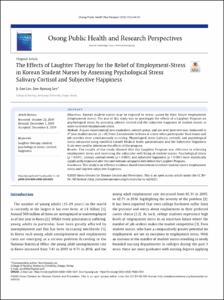The Effects of Laughter Therapy for the Relief of Employment-Stress in Korean Student Nurses by Assessing Psychological Stress Salivary Cortisol and Subjective Happiness
- Keimyung Author(s)
- Lee, Soo Kyoung
- Department
- Dept. of Nursing (간호학)
- Journal Title
- Osong Public Health and Research Persptectives
- Issued Date
- 2020
- Volume
- 11
- Issue
- 1
- Keyword
- laughter therapy; student; psychological stress; cortisol; happiness
- Abstract
- Objectives:
Korean student nurses may be exposed to stress caused by their future employment (employment stress). The aim of this study was to investigate the effects of a Laughter Program on psychological stress, by assessing salivary cortisol and the subjective happiness of student nurses in order to relieve employment stress.
Methods:
A quasi-experimental, non-equivalent, control-group, and pre-test/post-test was conducted in 4th year student nurses (n = 48) from 2 universities in Korea at a time when participants’ final exams and job searches were simultaneously occurring. Physiological stress (salivary cortisol), and psychological stress measured using modified Cornell Medical Index questionnaire and the Subjective Happiness Scale were used to determine the effects of the program.
Results:
The results of the study showed that the Laughter Program was effective in relieving employment stress and increasing the subjective well-being of student nurses. Psychological stress (p < 0.001), salivary cortisol levels (p < 0.001), and subjective happiness (p < 0.001) were statistically significantly improved after the intervention compared with before the Laughter Program.
Conclusion:
This study is an effective evidence-based intervention to reduce student nurses employment stress and improve subjective happiness.
- Publisher
- College of Nursing (간호대학)
- Citation
- Ji-Soo Lee and Soo-Kyoung Lee. (2020). The Effects of Laughter Therapy for the Relief of Employment-Stress in Korean Student Nurses by Assessing Psychological Stress Salivary Cortisol and Subjective Happiness. Osong Public Health and Research Persptectives, 11(1), 44–52. doi: 10.24171/j.phrp.2020.11.1.07
- Type
- Article
- ISSN
- 2233-6052
- Source
- https://ophrp.org/journal/view.php?number=542
- Appears in Collections:
- 2. College of Nursing (간호대학) > Dept. of Nursing (간호학)
- 파일 목록
-
-
Download
 oak-2020-0015.pdf
기타 데이터 / 386.99 kB / Adobe PDF
oak-2020-0015.pdf
기타 데이터 / 386.99 kB / Adobe PDF
-
Items in Repository are protected by copyright, with all rights reserved, unless otherwise indicated.